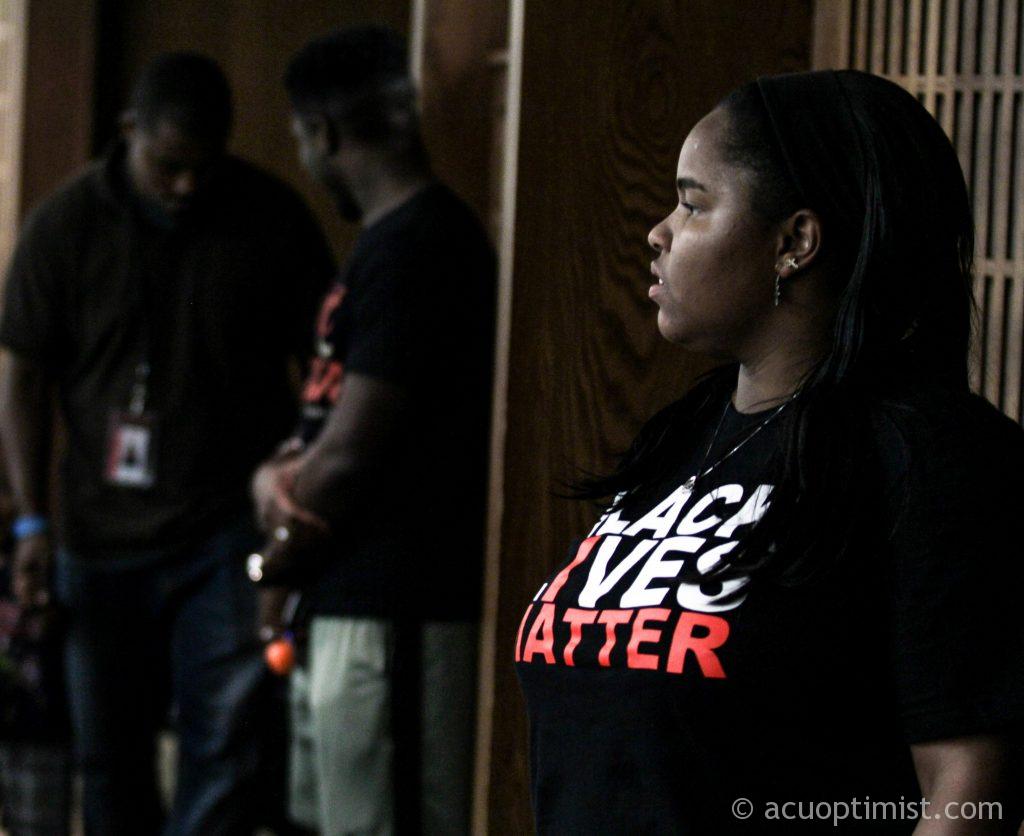Cultural Awareness Week discussed “Black Lives Matter” in a forum Wednesday night featuring alumnus Dr. Brandon Jones.
Jones, assistant director and coordinator of academic coaching, advising and learning strategy consulting at Clemson University in South Carolina, also spoke at a luncheon Wednesday afternoon to explain the Black Lives Matter movement. Keeping with the week’s theme, “Misunderstood Populations,” he focused the forum on the misunderstandings about both the movement and the phrase itself. About 200 people, including students, faculty and the Abilene community, came to Hart Auditorium to hear Jones speak.
Mickayla Hohhertz, freshman psychology major from Temple, said she attended other sessions throughout the week and thinks the BLM movement is important. Youlanda Hunter, business operations coordinator in the Department of Athletics, came with her husband, James. Their son attends ACU so they wanted to hear how the issue affects him.
“I just want to kind of get a perspective on where the Black Lives Matter movement is coming from other than what I’ve been reading and seeing in the news,” James Hunter said. “I just wanted to hear what else was being said.”
The Office of Multicultural Affairs (OMA) showed a video about BLM before Chapel, hosted a luncheon with Jones after Chapel and ended the day’s discussion with the evening forum which was live-streamed on the OMA Facebook page.
In his presentation, Jones started with a historical background about the black community in the U.S. starting in the 16th century and ending with issues in today’s culture, setting the context for the BLM movement. He said it would be inappropriate to tell people to forget the Holocaust or the Trail of Tears, yet many Americans will tell black people to forget what their ancestors suffered in this nation by slavery. Jones included issues ranging from the original “Birth of a Nation” film, to Colin Kaepernick, the confederate flag and the Voting Rights Act.
Jones then included Scripture, saying “all lives matter” to God in John 3:16, but Jesus does call out specific groups, such as “Blessed are the poor in spirit,” in Matthew 5:3. Jesus said what people do for “the least of these” they do for Him, so Jones said, “It’s ok to say that specific lives matter.”
Jones listed Biblical solutions for supporting black lives, including Genesis 4:10 when God says, “Your brother’s blood cries out to me from the ground.” Jones said although he doesn’t agree completely with the original BLM movement, the movement started addressing the situation in a way Christians have not yet done.
“The movement, I think, is very important,” Jones said. “But at the same time, I don’t necessarily agree with everything they stand for as an organization but I appreciate the fact that they’re out there on the front lines forcing this conversation to happen.”
Jones said Jesus spent time with lepers, the blind, the lame and prostitutes. He used Exodus 4:12, in which the Egyptians fear Israelite slaves multiplying, to say that the black community has strength in numbers, but many people don’t like that. He also said in Micah 6:8 the Lord requires people to “do justice.” Jones said the most practical solution is to “start where you are” just as Moses started the Exodus with a staff.
“Jesus pointed specifically to that group and said, ‘Your life matters,'” Jones said. “‘As a leper, as a sinner, your life matters. And it matters so much I’m gonna die for it.’ Jesus isn’t asking us to die for anybody’s sins, he’s asking us to love and care for these people as he did.”
The forum ended with questions and audience members asked for practical solutions, how the church should respond, the difference between white privilege and racism, and how to reach out to those who are ignorant about racial issues. Jones said although the forum could make some people uncomfortable, he believes students need to have conversations about things they don’t agree with.
Angeles Flores,freshman English education major from Houston, said she enjoyed the forum because she was already supporting BLM but she wanted to learn more.
“I’m a minority as well, but I don’t feel as much oppression as they do, and I want to know how we can help it,” Flores said. “I liked how everyone had questions and tried to gain more understanding.”
Jones graduated from ACU with a degree in graphic design in 2006, then got his Master’s of Education in 2009. He worked in the First-Year Program for several years as a peer advisor. Jones said while he was a student, the university had many underlying racial tensions and the university has since then taken steps to include more minority students. However, he said ACU and universities throughout the country still need to work to retain minority students.
Prentice Ashford, director of the Office of Multicultural Affairs, said OMA gave “Black Lives Matter” t-shirts to students who participated in a video, and will be taking orders for the same shirts starting Friday. The letters “I” and “matter” are highlighted red, while the rest of the letters are white on black cloth.

